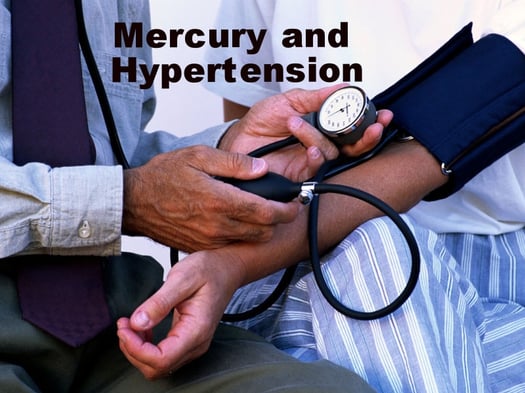
There are over thirty minerals that are now considered essential to life. Most of these are considered trace minerals, meaning we only need very tiny
Hypertension and Mercury Toxicity
Ronald Grisanti D.C., D.A.B.C.O., D.A.C.B.N., M.S.

A growing body of medical literature has discovered the damaging effects of mercury on endothelial (the inner lining of blood vessels) function and vascular smooth muscle function.
Mercury induces mitochondrial dysfunction with reduction in adenosine triphosphate (ATP), depletion of glutathione, and increased lipid peroxidation. Increased oxidative stress and reduced oxidative defense are common.
The overall vascular effects of mercury include increased oxidative stress and inflammation, reduced oxidative defense, thrombosis, dyslipidemia, and immune and mitochondrial dysfunction.
The clinical consequences of mercury toxicity include hypertension, coronary heart disease, myocardial infarction, cardiac arrhythmias, reduced heart rate variability, increased carotid intima-media thickness and carotid artery obstruction, cerebrovascular accident, generalized atherosclerosis, and renal dysfunction.
Mercury inactivates catecholaminei-0-methyl transferase (COMT). COMT is an enzyme principally involved in catabolism (the breaking down) of catecholamines at the sympathetic nerve endings.
Catecholamines are hormones made by the adrenal glands. These glands are on top of the kidneys. Catecholamines are released into the blood when a person is under physical or emotional stress. The main catecholamines are dopamine, norepinephrine, and epinephrine (which used to be called adrenalin).
The consequence of mercury on COMT is the fact that serum and urinary epinephrine, norepinephrine, and dopamine will increase. This effect will increase blood pressure and may be a clinical clue to mercury-induced heavy metal toxicity.
It is important to note that mercury diminishes the protective effect of fish and omega-3 fatty acids which has been found to have value in the management of reducing high blood pressure.
Mercury toxicity should be evaluated in any patient with hypertension, coronary heart disease, cerebral vascular disease, cerebrovascular accident, or other vascular disease.
If you are suffering with hypertension it is of vital importance to have your doctor order the following labs: Erythrocyte and whole blood toxic element levels and/or a 24 hour toxic metal urine tests using a challenging chelating agent like DMSA.

If your test reveals high levels of mercury it is important to find a doctor trained in functional medicine and is able to prescribe an effective protocol to chelate the toxic metal and decrease the load on your body.
This in fact may be the missing piece of the puzzle in reducing high blood pressure.
Houston MC, Role of mercury toxicity in hypertension, cardiovascular disease, and stroke.J Clin Hypertens (Greenwich). 2011 Aug;13(8):621-7.

There are over thirty minerals that are now considered essential to life. Most of these are considered trace minerals, meaning we only need very tiny

A traditional Southern embellishment to soups, stews, and entrées, collard greens provide an impressive array of key vitamins and minerals, including vitamins A, K, C,...